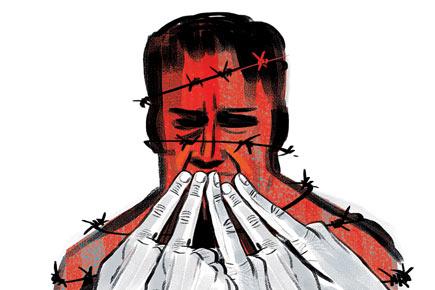Silence = Death, a resonant slogan from the 1990s, used by many political movements over time, encapsulates the essential nature of much political activism and protest, no matter what the political complexion

 Silence = Death, a resonant slogan from the 1990s, used by many political movements over time, encapsulates the essential nature of much political activism and protest, no matter what the political complexion. To be silent about injustice is to perpetrate injustice. To not allow everyone a voice is to oppress them. To not speak up for your rights is to choose your oppression. To be political you must constantly use your right to express yourself.
Silence = Death, a resonant slogan from the 1990s, used by many political movements over time, encapsulates the essential nature of much political activism and protest, no matter what the political complexion. To be silent about injustice is to perpetrate injustice. To not allow everyone a voice is to oppress them. To not speak up for your rights is to choose your oppression. To be political you must constantly use your right to express yourself.
ADVERTISEMENT
The attacks on the French magazine Charlie Hebdo have led to much thinking of these issues of the limits and freedoms of expression.
The most strident voices felt nuance was a timewasting surrender to fundamentalism, ironically oblivious of how fundamentalist this sounds. To speak in stentorian absolutes imbues you with the uncompromising stance of the warrior, the ‘real man’ vibe. To pause in doubt is the same as being a sell-out and waffler. To the angry flower, trembling with beautiful eloquent indignation, all questions are apologist, relativist weeds messing up a self-righteous landscape. They could all consider a new slogan: Je Suis Arnab.

Illustration/Amit Bandre
So, suggestions of the disaffected context in which Charlie Hebdo functions, were sometimes met with a sneer.
Outspokenness is associated with a kind of fearlessness — a characteristic often presented as being intrinsic, not contextual. In fact it can be either. All utterances have a context. If you refuse to acknowledge a context, of speaker and spoken to, then it sometimes feels like you would like to pretend that you too are out of the context of your privilege — of your gender or caste or class or connections. And being silent about privilege perpetrates privilege, just as silence about oppression can perpetrate oppression. Many of us speak because we can, partly be protected by a resilient web of privilege. Interesting, no, how when you speak on behalf of someone who is silenced, it is often you whose freedom to speak expands, not the silenced ones?
This was a truth all too sharply present in the case of the Tamil writer Perumal Murugan and his 2010 book, Madhorubhagan, recently published in English translation as One Part Woman. The story of a childless couple who participate in a temple ritual where consensual sex between un-connected men and women is permitted, in the hope of conceiving a child. The publication of the English translation caused the RSS to burn copies of the book. Reportedly now, about 40 caste groups have asked the administration to ban the book, besides threatening the writer.
The administration has provided him no protection, his students have been guarding him, he ain’t gonna be saying Je Suis Rushdie anytime soon. There is barely a murmur in the media, regular or social. Calling the writer for ‘peace talks’ last week, the police essentially tried to make him agree to the protestor’s demand of unconditional apology for a work of fiction.
A writer of fiction, not working in English, becomes painfully aware at such a point, of the intricacies of privilege, when most remain silent about his silencing. He begins to understand his fearless speech will be in a cacaphonous wilderness. So, he writes a Facebook post: “Perumal Murugan, the writer is dead. As he is no God, he is not going to resurrect himself...As an ordinary teacher, he will live as P Murugan. Leave him alone.” Making, of silence a palpable declaration, something like deep protest, he retreats. A few people tweet about it. One or two news shows happen.
Some of us order his book online and read it silently. Maybe that’s all that’s possible in noisy times.
Paromita Vohra is an award-winning Mumbai-based filmmaker, writer and curator working with fiction and non-fiction. Reach her at www.parodevi.com.
The views expressed in this column are the individual’s and don’t represent those of the paper.
 Subscribe today by clicking the link and stay updated with the latest news!" Click here!
Subscribe today by clicking the link and stay updated with the latest news!" Click here!






